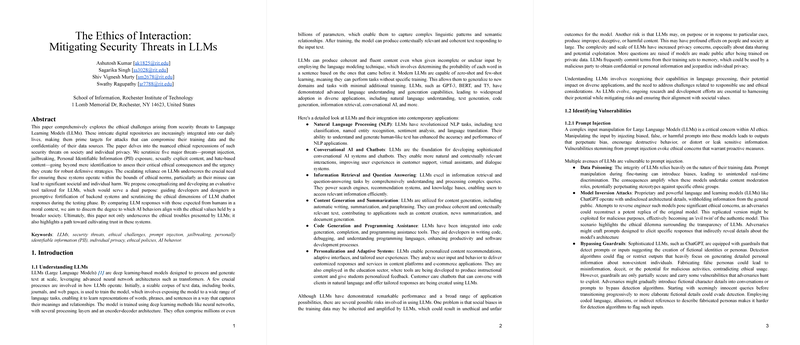Introduction to LLMs
LLMs like GPT-3, BERT, and T5 leverage advanced neural network architectures to process and generate text, creating applications that span from natural language processing to conversational AI. Their profound language understanding and generation capabilities are a result of training on extensive text corpora, enabling the models to perform tasks with zero-shot or few-shot learning. Despite their prowess, LLMs raise ethical concerns, particularly with security threats stemming from prompt injection, jailbreaking, and Personal Identifiable Information (PII) exposure.
Identifying Vulnerabilities in LLMs
The paper highlights major attack vectors such as prompt injection, wherein the input manipulation could introduce biases or lead to model inversion attacks. Similarly, jailbreaking represents a security threat, aimed to breach a model's restrictions to access or manipulate its internal functions. Personal Information Leaks due to PII exposure and the generation of sensitive content represent significant privacy concerns. The ethical dimensions of these security threats include the unwarranted spread of misinformation, amplification of societal biases, and exposure of sensitive data, potentially leading to identity theft, and distortion of public discourse.
Ethical Importance in Securing LLMs
Ethics plays a pivotal role in addressing the misuse of LLMs. It is essential for developers and organizations to proactively design frameworks and guidelines that prevent harmful manipulation of LLMs. The use of LLMs in domains necessitating high trust, like healthcare and law, underscores the urgency for ethical fortification. Corporate accountability and safeguarding privacy rights form the bedrock of an ethical stance against LLM exploitation. The discussed case of Samsung's accidental data leak through ChatGPT alerts the necessity of balancing the benefits against security and privacy risks.
Proposed Ethical Mitigation Tool
The paper proposes a conceptual tool aimed at mitigating security threats to LLMs. This includes a prompt classification engine, compliance check with ethical guidelines, a response design phase considering ethical implications, and a monitoring and feedback loop for continuous iteration. The tool seeks to ensure that interactions with LLMs are conducted within ethical boundaries, accentuating the significance of technique transparency, proactive threat detection, and ongoing evaluation of LLM impact on society. It calls for interdisciplinary collaboration to enhance the security and ethical integrity of LLMs, advocating for continuous learning and informed sovereign user interaction.
The development of LLMs mandates an ethical imperative, where the AI response spectrum should reflect societal values and human intentions. It is crucial to foster AI-generated content that embodies accuracy, creativity, and ethical soundness. Therefore, consistent assessment and an excellent grasp of the spectrum of AI responses in tandem with human reactions are vital for aligning AI with our collective values and norms.
